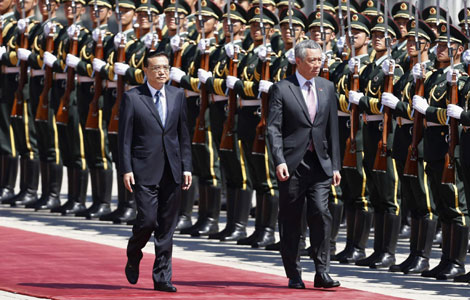China economy stabilizing: NBS
Updated: 2013-08-26 16:26
(Agencies)
|
||||||||
China's economy is showing clear signs of stabilization, helped by policy support and some improvement in global demand, and is on track to meet the government's 2013 growth target of 7.5 percent, the state statistics bureau said on Monday.
The issue of local government debt also remained under control, the National Bureau of Statistics said at a briefing organized by the foreign ministry that may have been aimed at allaying global concern about China's slowdown.
"We are confident that the economy is sustaining the positive momentum in the second half and confident of meeting the economic growth target," said Sheng Laiyun, the NBS's spokesman.
"The economy is showing some positive changes. Signs of growth stabilization are becoming more obvious," he said.
A private factory survey last week reinforced signs of stabilizing in the economy in the third quarter after the government took supportive measures, including scrapping taxes for small firms and accelerating investment in urban infrastructure and railways.
That followed a raft of July data which saw factory output grew at its fastest pace since the start of the year, and surprisingly strong trade data.
China's annual economic growth slowed to 7.5 percent in the second quarter, down from 7.7 percent in the three months ending March 31 - the ninth such deceleration in the past 10 quarters.
Beijing has said it is willing to tolerate slower growth as it pushes reforms designed to reduce pollution, social inequity and an economic growth model which has an over-reliance on debt-financed construction and exports.
Sheng said it was very difficult for China to maintain a fast growth rate due to structural adjustments and declining surplus labor, but rising consumption, increasing urbanization and catch-up growth in less developed regions will be long-term economic drivers.
The government has launched a series of targeted measures recently to support the economy, including scrapping taxes for small firms, offering more help for ailing exporters and accelerating investment in urban infrastructure and railways.
But rapidly slowing growth has also been putting pressure on China's heavily indebted companies and provincial governments, raising concerns that the country's explosion in credit since 2008 may be on the verge of a meltdown.
Credit in China's economy almost doubled between 2008 and last year, pushing investment to 46 percent of GDP, much of that into infrastructure and property.
The China Banking Regulatory Commission has recently begun working with China's securities regulator to encourage the securitization of loans to help lenders sell problematic loans and is developing a platform to help banks sell such loans to investors.
That follows a move last year to let provincial governments set up their own debt-purchasing companies.
"The central government is attaching great importance to developments in the debt issue," Sheng said.
Most Viewed
Editor's Picks

|

|

|

|

|

|
Today's Top News
Luxury imports may face fewer big-ticket payoff days
Joint sea drill shows improved relations
UN to probe alleged chemical attack
Bo insists he did not abuse power
Newly born panda cub at Washington zoo doing fine
Market regulators need to fix loopholes
Singapore PM aims to cement relations
Experts call for details on rumor cases
US Weekly

|

|
















